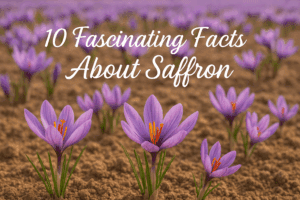Saffron, the golden-hued spice rooted in Persian tradition, now draws wellness enthusiasts who want support for women’s health. Many people ask us: Does saffron increase estrogen? Let’s look at the research, how saffron interacts with hormones, and whether it can support hormonal balance.
Understanding Estrogen and Its Role
Estrogen plays a central role in the female body: it regulates the menstrual cycle, supports bone health, and influences mood, skin, and overall vitality. When estrogen falls out of balance, too high or too low, it can trigger fatigue, mood swings, hot flashes, and sleep disturbances, especially during menopause.
Saffron’s Bioactive Compounds: What’s Inside?
Saffron isn’t just a culinary treasure; it’s packed with powerful plant compounds:
- Crocin: A potent antioxidant, supports mood and cognitive health
- Safranal: Known for its calming, mood-elevating effects
- Picrocrocin: Contributes to saffron’s unique flavor and may play a role in wellness
But do any of these directly affect estrogen levels?
What Does the Research Say?
Saffron and Estrogen: The Evidence
Current scientific research does not show that saffron directly increases estrogen production or acts as a phytoestrogen (a plant-based compound that mimics estrogen in the body, like those found in soy or flaxseed). Instead, saffron’s benefits for women’s health appear to be linked to its impact on mood, stress, and overall hormonal balance.
Key Findings:
- Mood and PMS Relief: Several studies suggest saffron can help alleviate symptoms of premenstrual syndrome (PMS) and mild to moderate depression, believed to be saffron’s influence on serotonin, a neurotransmitter that regulates mood, rather than a direct effect on estrogen.
- Menopause Support: Saffron may help ease hot flashes, mood swings, and sleep disturbances in menopausal women. These benefits are attributed to saffron’s calming and mood-balancing properties, not an increase in estrogen levels.
- No Estrogenic Activity: Clinical studies have not found saffron to act like estrogen or to stimulate estrogen production in the body.
How Does Saffron Support Hormonal Balance?
While saffron doesn’t raise estrogen, it can support women’s wellness in other meaningful ways:
- Reduces stress and supports emotional well-being
- May help regulate sleep patterns
- Eases fatigue and promotes energy
- Supports healthy inflammatory response
By helping to balance mood and reduce stress, saffron may indirectly support overall hormonal harmony, making it a valuable addition to daily wellness rituals.
Should You Use Saffron for Hormonal Health?
If you’re seeking natural ways to support your mood, energy, and well-being, especially during PMS or menopause, saffron can be a gentle, effective option. Always consult your healthcare provider before starting any new supplement, especially if you have a hormone-related condition or are taking medication.
The Zarafron Difference
As we prepare to launch, Zarafron commits to the highest standards of quality and authenticity. We share saffron’s timeless benefits in their most authentic, potent form, so you can glow from within, naturally.
Join our waitlist for early access, sneak peeks, and updates as we bring a new era of saffron wellness to life. Sign up at zarafron.com and be part of our journey.




